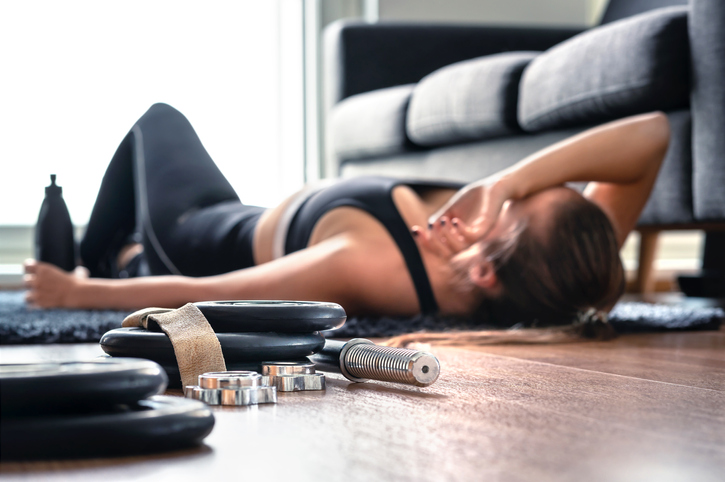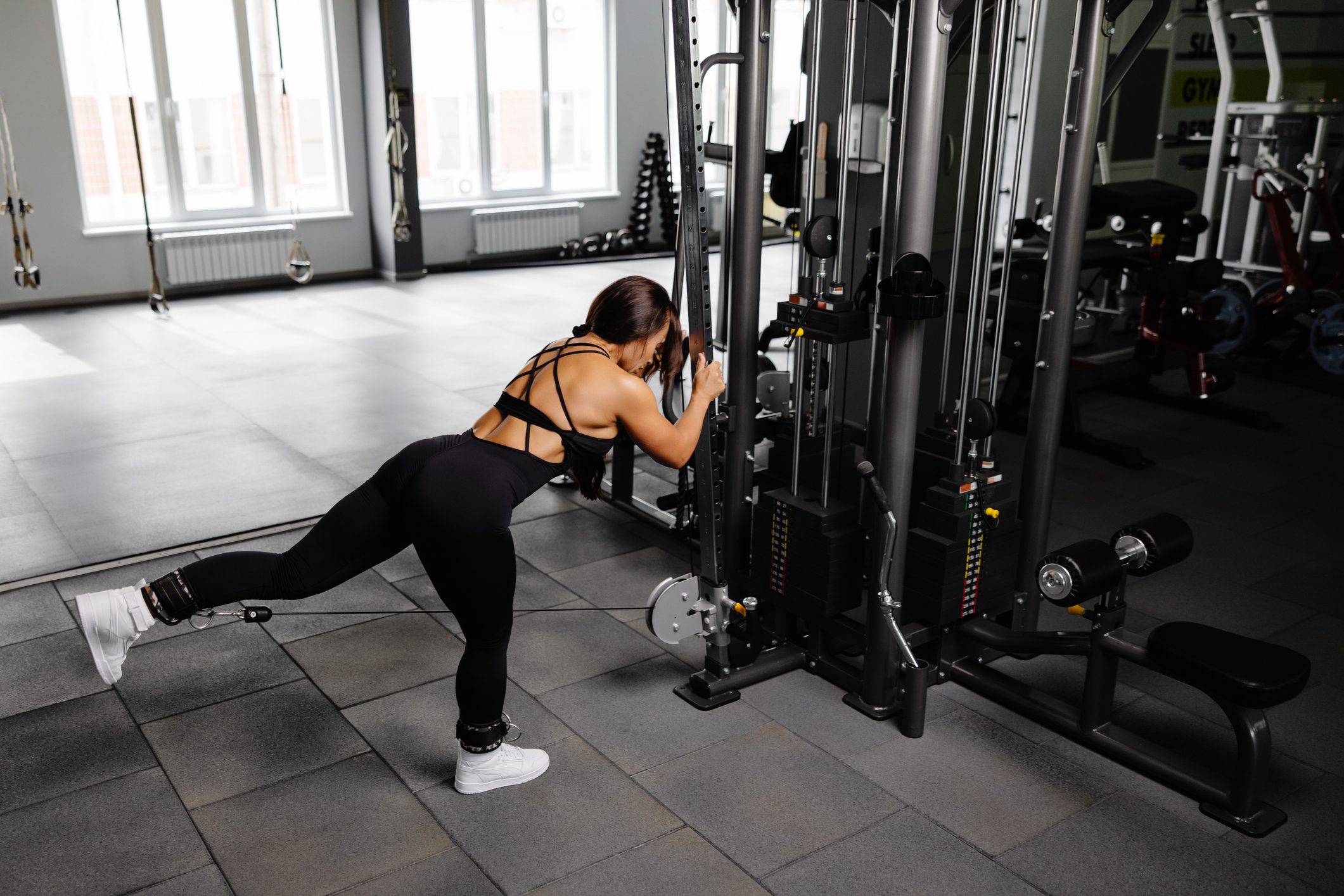Are you killing yourself at the gym, pushing yourself on your Peloton®, or waking up at 4 a.m. to get some extra miles in…. but you can’t lose weight, no matter how hard you try?
Regardless of what you’re doing, you may think you’re not doing enough. So you get frustrated and resolve to go harder.
But over-exercise might be the problem.
Too Much Exercise Could Be Working Against Weight Loss
Overexercise might be holding your weight hostage, but it can also do more harm than good.
Listen, nobody is more pro-workout than I am.
Exercise creates so many benefits for longevity, stronger bones, better insulin sensitivity, longevity… the list goes on and on.
When you improve those things, you become a better fat burner.
Your metabolism becomes healthier, since muscle requires more energy to stay on your body.
But what exercise doesn’t do as well as everyone previously thought is help you lose weight.
Sure, you’ll probably drop a few pounds with a little exercise.
But newer research suggests exercising won’t help you lose as much weight as you might think.
A few years ago, researchers showed that the calories we burn plateau at a certain point. Why? Because our bodies adapt to increased physical activity.
According to these researchers, “total energy expenditure increases with physical activity at low activity levels but plateaus at higher activity levels as the body adapts to maintain total energy expenditure within a narrow range.” (1)
In other words, exercise has diminishing returns.
Of course, how much weight you lose from exercise depends on things like your age, your gender, and your general health.
But bigger picture, over-exercising can wreak havoc on your weight, your heart, immune system, and so much more.
Consider The Million Women Study, which looked at over one million women between 50 to 64.
At the beginning of this study, researchers asked these women how often they did strenuous exercise.
About three years later, these women completed a questionnaire asking about how many hours each week they spent on specific exercises.
Overall, researchers associated moderate physical activity with a lower risk.
However, those women who did strenuous activity daily had a higher risk of heart disease, stroke, or a blood clot breaking free. (2)
Simply put: Compulsive exercise and over-exercise are not healthy for your waistline or overall health.
How do you know whether you’re overdoing it? Here are three reasons that exercise might be holding your weight hostage.
Reason 1: You’re Often Stressed, Moody, and Hungry
If those hours in the gym or spin class often leave you nose-diving into sugary foods, snapping at coworkers and your significant other, and stressed out at work, you could be overdoing it.
Exercise boosts stress hormones, especially cortisol. Your body doesn’t know the difference between exercise stress and normal stress.
A little bit of intense exercise can make your body more resilient.
But when you over-exercise and keep cortisol jacked up when it should simmer down, you break down muscle instead of building it.
High cortisol also stores more fat around your belly. It can increase your appetite and mess with your thyroid function, which can slow down weight loss.
Plus, too much cortisol also makes you moody, irritable, and unable to concentrate or sleep.
As a result, you feel lousy and hungry all the time… which could boomerang on you with overeating and weight gain.
Reason 2: You’re Often Tired
Another sign of overtraining is feeling fatigued or worn out.
Every workout seems like a struggle, and your performance is either not getting better or is getting worse.
Maybe you can’t go as long or as hard as you used to, or lift as much.
And being constantly exhausted beats you up mentally and physically, which means you could get hurt.
If you notice that your resting heart rate is riding higher than normal or your workout is making you feel exhausted rather than energized, you could be overdoing it.
When this happens, some clients feel determined to “push through it” and keep up their routine.
Yet almost every time, that approach backfires.
Reason 3: Your Immune System is Taking a Beating
Moderate exercise improves your immune system, but overdoing it can suppress it.
You think you’re getting healthier and you’re setting yourself up to get sicker.
If you’re finding that you get sick more often with frequent workouts, you might want to look closely at what you’re doing and how often you’re doing it.
Plus, over-exercise can accelerate oxidative stress, where your body’s antioxidant defense system can’t manage its free radical load.
A weakened immune system, accelerated aging, and age-related diseases such as heart disease can all occur from oxidative stress. (3)
No matter what your personal goals are, the end destination is always the same: To feel better than you ever have. My Ultimate Health Roadmap provides short, actionable steps you can take RIGHT NOW to be the best version of you. The guide is FREE, and you can only get it here.
What’s the Solution?
If you suspect over-exercise is making your body hold on to weight, you don’t need to throw the baby out with the bathwater!
The answer is to get moderate amounts of the right exercise, along with the correct recovery.
First, take the right approach to exercise.
You don’t need hours at the gym, in spin classes, or doing tedious at-home workouts to strengthen your immune system and get all the other fab benefits of exercise.
Instead, take this four-step approach to exercise.
- Move more, period. Everything counts here! Park further from the grocery store door, take a park walk with your bestie… anything to fit in those steps.
- High-intensity interval training (HIIT). With HIIT or burst training, you want to go hard. The whole thing should take maybe 10 or 15 minutes, tops. Learn more about HIIT in this blog.
- Resistance training. Lift the heaviest weight you can in good form. Again, this shouldn’t take long. How much weight should you lift if you’re a newbie, especially if you have an autoimmune disease? Listen up to this podcast.
- Mindful movement. I’m talking about restorative and balancing exercises here like yoga.
I deep-dive into all 4 steps in this article.
Here are three more ways to optimize your fitness routine so you lose weight and get all of the many other exercise benefits without overdoing it.
Mix Things Up
Do the same routine every day, and you’ll get bored, stagnant, and your weight loss will plateau.
Your body is meant to be adaptive. Don’t be afraid to mix things up and cross-train your exercise routine.
Recover Well
Recovery is equally important – maybe even more so – than exercise itself. When you recover well, you get a better workout.
Here are some ways to recover smartly:
- Take rest days. With exercise, you need intensity days and you need recovery days.
- Get the right nutrition. That means plenty of clean, lean protein, healthy fats, and nutrient-packed, fiber-rich veggies.
- Eat to support your level of exercise. If you’re working out intensely, be mindful about getting more protein.
- Get the right nutrients, too. At the very minimum, that includes:
- A multivitamin and omega-3 fatty acids. We’ve removed the guesswork with our convenient Daily Essentials Multi + Omegas packets. Every packet combines a superior multivitamin-mineral and omega-3s fatty acids. Pack one in your purse or bag, take with a meal, and bam… you’ve met your foundational nutrient needs!
- Magnesium is critical for over 300 enzymatic reactions. Muscle contraction, sleep, stress management, and so much more depend on this critical mineral. Magnesium Body Calm is a highly absorbable form of magnesium.
- Vitamin D is so important for physical captivity, yet studies show that many athletes are deficient in this vitamin. (4)
Vitamin D Plus is our new, improved vitamin D product. We combine therapeutic doses of vitamin D3 along with bioavailable vitamin K1 (Phytonadione) and vitamin K2 (Menaquinone-7), as well as geranylgeraniol (GG) to complement those benefits, all in one easy-to-take softgel.* You can only get it here.
- Hydrate more when you workout. Keep a canteen nearby filled with clean, filtered water. Once you’re thirsty, you’re already dehydrated.
- Aim for at least eight hours of sleep every night. This is the ultimate recovery strategy! If you have trouble falling or staying asleep, Sleep Candy™ combines melatonin with other calming nutrients to get deep, restorative sleep… every single night.
Be Aware That You May Be Overdoing It
When you overdo working out, you may also be overdoing dieting and starving yourself.
When you’re doing that, you're not eating enough and your body doesn't get the fuel it needs to function well or heal from the workouts.
And it also slows down to conserve calories, which may make you pack on the pounds. Or get sick.
If the main reason you’re out there exercising is because you want to lose weight but the scale isn’t cooperating, rethink how much you’re exercising.
Listen to your body. Get some rest. Cut back or stop exercising when you don't feel well or are under a lot of stress.
Change that mental programming that tells you you’re doing something bad or wrong if you’re not exercising hard every day.
Too much healthy food is unhealthy. But too much exercise can also do more harm than good.
If you see the warning signs of overexercise or compulsive exercise, I’m giving you permission to take your foot off the gas! More is not always better.
As a busy entrepreneur, the one thing I prioritize is great sleep. I don’t perform at my best when I don’t sleep well, so getting 7–9 hours of quality sleep is non-negotiable. My Sleep Cheat Sheet gives you my top tips for solid, consistent sleep every night. Get the FREE guide here.
References
- Pontzer H, Durazo-Arvizu R, Dugas LR, Plange-Rhule J, Bovet P, Forrester TE, Lambert EV, Cooper RS, Schoeller DA, Luke A. Constrained Total Energy Expenditure and Metabolic Adaptation to Physical Activity in Adult Humans. Curr Biol. 2016 Feb 8;26(3):410-7. doi: 10.1016/j.cub.2015.12.046. Epub 2016 Jan 28. PMID: 26832439; PMCID: PMC4803033.
- Armstrong ME, Green J, Reeves GK, Beral V, Cairns BJ; Million Women Study Collaborators. Frequent physical activity may not reduce vascular disease risk as much as moderate activity: large prospective study of women in the United Kingdom. Circulation. 2015 Feb 24;131(8):721-9. doi: 10.1161/CIRCULATIONAHA.114.010296. Epub 2015 Feb 16. PMID: 25688148.
- Liguori I, Russo G, Curcio F, Bulli G, Aran L, Della-Morte D, Gargiulo G, Testa G, Cacciatore F, Bonaduce D, Abete P. Oxidative stress, aging, and diseases. Clin Interv Aging. 2018 Apr 26;13:757-772. doi: 10.2147/CIA.S158513. PMID: 29731617; PMCID: PMC5927356.
- Wiciński M, Adamkiewicz D, Adamkiewicz M, Śniegocki M, Podhorecka M, Szychta P, Malinowski B. Impact of Vitamin D on Physical Efficiency and Exercise Performance-A Review. Nutrients. 2019 Nov 19;11(11):2826. doi: 10.3390/nu11112826. PMID: 31752277; PMCID: PMC6893541.
The views in this blog by JJ Virgin should never be used as a substitute for professional medical advice. Please work with a healthcare practitioner concerning any medical problem or concern. The information here is not intended to diagnose, treat, or prevent any disease or condition. Statements contained here have not been evaluated by the Food and Drug Administration.
*These statements have not been evaluated by the Food and Drug Administration. This product is not intended to diagnose, treat, cure, or prevent any disease.





